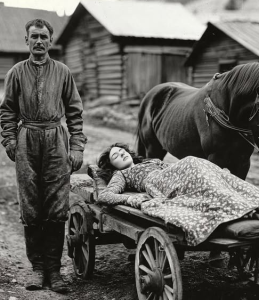
The morning fog still clung to the trees when Daniel loaded the final crate into the back of the truck. His mother, Ruth, stood beside him, her expression stern, arms folded tightly across her chest.
“She’s no good to you like this,” Ruth said, voice cold and certain. “You’re wasting your life caring for someone who won’t get better.”
Daniel didn’t respond. He just stared at the silhouette of the house behind them, where Emily, his wife of seven years, lay frail and sleeping. For the past year, she had battled an undiagnosed illness — fatigue, fevers, aching bones, and moments where she’d forget her own name. Doctors were baffled. Their savings had dried up. Emily, once vibrant and full of laughter, had become a ghost in her own skin.
Ruth tightened her grip on his shoulder. “There’s an old cabin your grandfather built decades ago. No electricity, no neighbors. Peaceful. Clean air. If she’s going to heal, that’s the place. And if she doesn’t…” Ruth let the silence finish her thought.
Daniel hesitated, then nodded.
Emily barely stirred when he wrapped her in a warm blanket and carried her to the truck. Her skin was pale, hair brittle. She whispered something — maybe his name — but her voice was too faint. By the time they reached the cabin deep in the wilderness, she was sleeping again.
It was a simple place: one room, a wood stove, a stream nearby for water, and enough canned goods and dried food to last several months. Daniel told her he would return often, bring more supplies. That she just needed rest.
She blinked at him through the haze. “Don’t forget me,” she murmured.
“I could never,” he lied.
For the first few weeks, Daniel did return. Every weekend, then every other. But soon, his visits became rare. He stopped answering her notes left in a tin by the cabin door. When winter came, he didn’t return at all.
Ruth told neighbors Emily had gone to a retreat. That she needed “spiritual space.” Daniel filed for power of attorney, citing her incapacitation. With her signature, forged neatly on the dotted line, he sold her art, closed her bank accounts, and leased out the studio she’d once owned.
“She wasn’t going to use it anymore,” Ruth said, sipping tea. “At least it’s not going to waste.”
Daniel nodded but avoided her gaze.
Spring came again.
One year to the day after leaving her, Daniel drove back up the long dirt road to the cabin, not with food or medicine, but with papers. The deed to Emily’s grandmother’s farmhouse — property that had once belonged to Emily’s side of the family. Ruth had her eyes on it now. “No one’s lived there in years. And if Emily’s gone, it should revert to you.”
The forest was lush and green, birds chirping. The truck tires crunched over gravel. He parked by the cabin and stepped out, the deed in a leather folder tucked under his arm.
But the place wasn’t abandoned.
Smoke curled from the chimney. The woodpile was freshly stacked. A garden bloomed beside the porch — carrots, onions, herbs. The door creaked open.
And there she stood.
Emily.
Thin, yes. But stronger. Her hair longer, braided down one shoulder. Her eyes, once dulled by pain, burned with something Daniel didn’t expect: clarity. Awareness.
And something darker.
“I knew you’d come,” she said, stepping outside.
Daniel tried to smile. “Emily, I thought… I wasn’t sure if…”
“If I’d survive?” she finished. “You weren’t supposed to come back at all, were you? Just long enough to wait and claim what was mine.”
He opened his mouth, but no words came.
She held up a notebook — filled with dates, entries, and detailed letters. “I wrote everything down. Every time you didn’t come. Every time I was sick and alone. I knew something was wrong. You never planned to bring me back.”
Daniel’s throat tightened. “It wasn’t like that. I… I didn’t know what else to do. You were—”
“Sick?” she said. “I was sick. But I wasn’t disposable.”
Silence hung between them. Emily’s gaze fell to the folder in his hand.
“Let me guess,” she said. “You want the deed.”
He hesitated. “It’s just paperwork, Em. You haven’t set foot in that house in years.”
She stared at him for a long time, then laughed — not bitter, but sharp and sure. “I had a lot of time to think out here. About us. About you. About what survival means.”
She stepped back inside and returned with a letter in her hand. “From the county registrar,” she said, holding it up. “I had someone bring it out a month ago. I revoked the power of attorney. Changed the will. And I filed for separation. You won’t be taking anything else.”
Daniel’s face flushed. “You don’t have the strength for this. You’re not even well.”
“I wasn’t,” she replied. “But the wilderness healed me more than your love ever did.”
That night, Daniel drove away empty-handed, the deed folder still pressed against his chest like a shield.
Back at his mother’s house, Ruth stared at him when he walked in. “You got it?”
He didn’t answer.
She scowled. “She’s just a weak woman in the woods. What could she possibly do?”
“She survived,” he said softly. “That’s more than we gave her credit for.”
Months later, a small feature appeared in a regional magazine: “Artist Reclaims Life in the Wild: A Story of Survival, Solitude, and Strength.” Emily stood smiling next to her garden, now lush and expansive, her artwork hanging on the cabin walls behind her.
She spoke of betrayal, resilience, and rebirth.
She never mentioned his name.
But Daniel read every word.
And for the first time, he saw clearly the cost of listening to the wrong voice — and the strength of the one he tried to leave behind.
